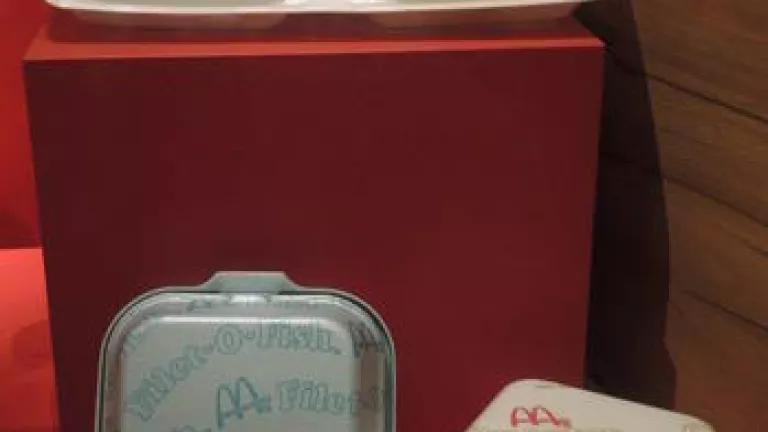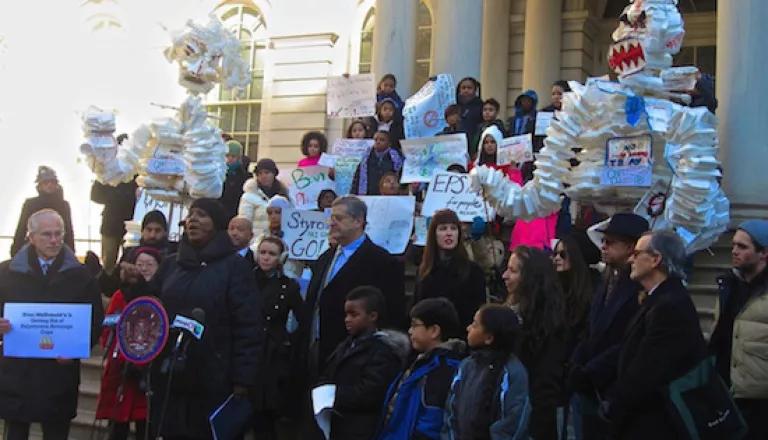New York City Set to Ban Environmentally Troublesome Polystyrene Foam Coffee Cups and Food Containers - A Victory for Cleaner Streets, Parks and Waterways

In one of the first big environmental decisions of the administration of New York City Mayor Bill de Blasio, Sanitation Commissioner Kathryn Garcia is announcing today her determination that recycling of soiled polystyrene foam coffee cups and clamshells is impractical and will instead direct that restaurants, cafes and mobile food vendors end their use of containers made from the environmentally troublesome white foam.
The prohibition is set to take effect by July 1, 2015, consistent with a 2013 City Council law.
New York City thus will become the largest jurisdiction in the nation to prohibit polystyrene foam food and beverage containers and to require a transition to containers that are easier to recycle or compost.
PRETTY SOON, THE ONLY PLACE YOU MAY SEE THESE CONTAINERS IS AT THE SMTIHSONIAN. Pictured above are polystyrene foam food containers from McDonalds, now on display at the National Museum of American History in Washington D.C. McDonald's abandoned these polystyrene foam "clamshells" in the 1990s following consumer pressure to use more environmentally friendly containers. Now, New York City is joining Seattle, San Francisco, Portland, Washington D.C. and over 100 other jurisdictions around the country in requiring restaurants to drop polystyrene foam coffee cups and food containers and substitute containers that are easier to recycle or compost.
The Commissioner's determination is environmentally sensible and economically justified.
More than 100 other localities have already banned polystyrene foam food and beverage containers, which are impractical to recycle due to their high rates of contamination, extremely light weight and lack of proven markets.
Cities with bans already in effect include San Francisco, San Jose, Seattle and Portland. Washington D.C's Mayor signed legislation to prohibit polystyrene foam coffee cups and clamshells this past summer. And a ban on such containers at large chain stores recently took effect in Albany County (NY). Several other New York State counties are considering similar proposals, as are a number of cities across the country.
Polystyrene foam is biologically inert and can survive in the environment for hundreds if not thousands of years. It is a brittle substance, which breaks into tiny pieces and contributes disproportionately to litter problems on streets and in parks. It is also a significant source of waterway pollution, where it presents a danger to the health of marine species.
Last month, NRDC released an independent consultants' report, prepared by DSM Environmental Services, which concluded that the option of cost-effectively recycling soiled polystyrene foam food and beverage containers in New York was "speculative" and "untested."
The Dart Container Corporation, the nation's largest manufacturer of the problematic containers, and the American Chemistry Council waged an intense, largely behind-the-scenes battle - first to weaken the enabling legislation and then to convince the Sanitation Department not to move forward with the prohibition. According to the New York Times, Dart and the Chemistry Council spent close to 1 million dollars just to defeat the 2013 legislation in the New York City Council.
But school children throughout New York City - who spoke up in favor of litter-free parks and clean waterways - joined environmental groups and waste experts as big supporters of the City Council legislation that set the stage for Commissioner Garcia's expected announcement.
Among the organizations that participated in the campaign for enactment of the polystyrene foam ban in the New York City Council, in addition to NRDC, were Cafeteria Culture; Green Schools Alliance; Citizens Committee for New York City; Lower East Side Ecology Center; Manhattan Solid Waste Advisory Board; New York League of Conservation Voters; New York Public Interest Research Group; No Impact Project; plasticbaglaws.org; Civitas and We Act for Environmental Justice.

VICTORY! School kids, environmental groups, and City Councilmembers, including Margaret Chin, Tish James (now Public Advocate) and Lew Fidler (now retired) rally outside City Hall in 2013 in support of legislation that paved the way for the de Blasio Administration's decision to prohibit polystyrene foam food and beverage containers in New York City. A well-funded lobbying campaign by Dart Container Corporation and the American Chemistry Council to defeat the legislation and convince the Administration to reverse course proved unsuccessful.

